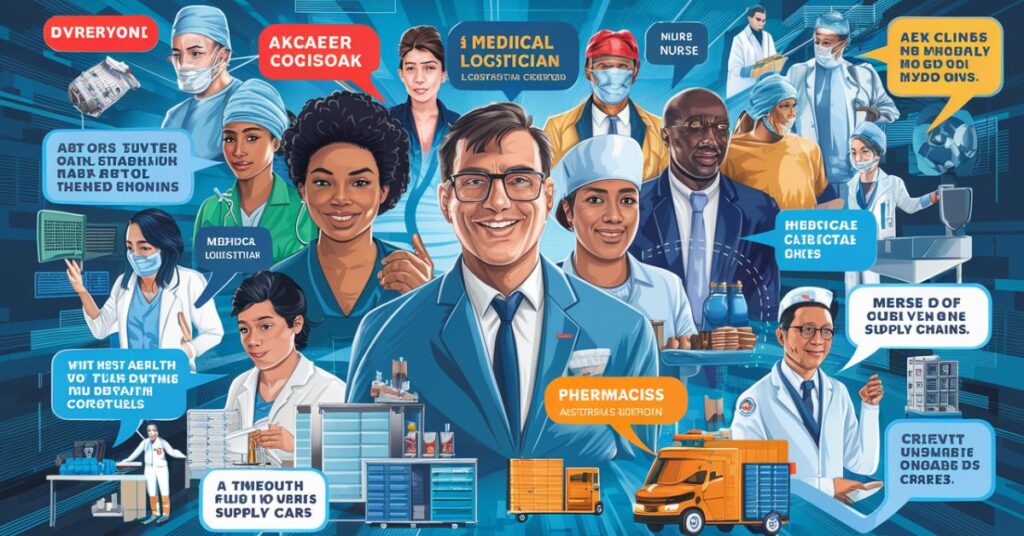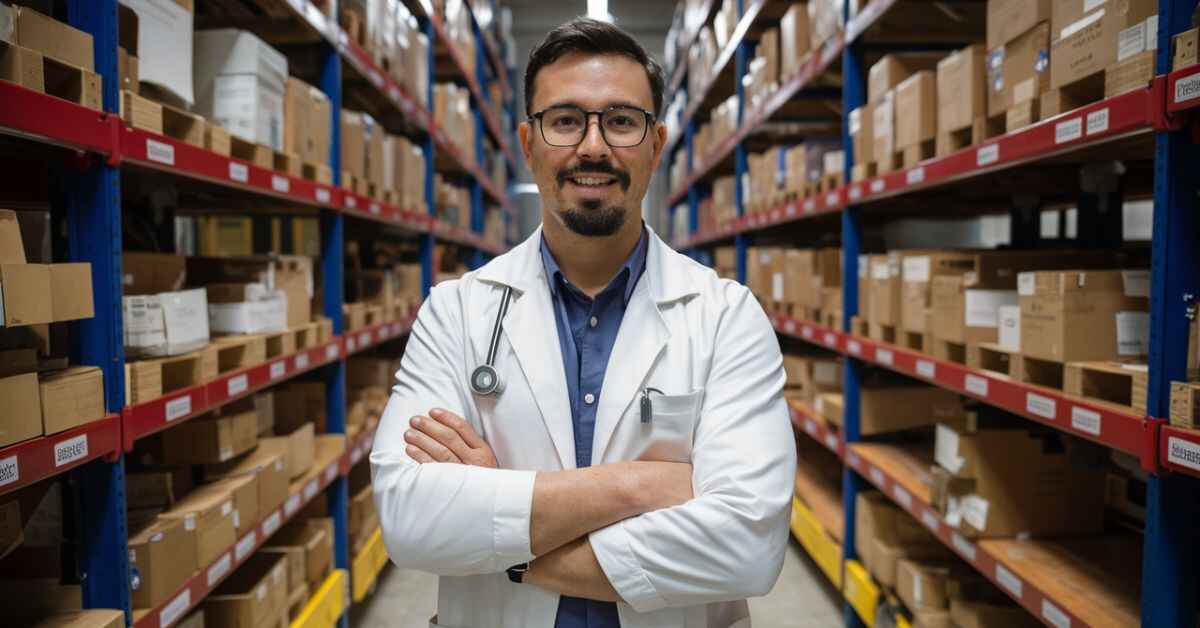The role of logistics and supply chain management has become increasingly essential. As hospitals, clinics, and pharmaceutical companies strive to deliver top-notch patient care while managing costs, the demand for skilled professionals in healthcare and medical logistics & supply chain management has skyrocketed.
Understanding Healthcare and Medical Logistics
Healthcare and medical logistics is a particular branch of supply chain management that emphases on the actual flow of medical supplies, equipment, and pharmaceuticals throughout the healthcare system. The scope of healthcare and medical logistics encompasses:
- Inventory management of medical supplies and pharmaceuticals
- Transportation of temperature-sensitive biologics
- Coordination of medical equipment maintenance and distribution
- Management of hospital supply chains
- Optimization of pharmaceutical supply chains
What sets healthcare logistics apart is its direct control of human lives. A delay in delivering crucial medications or medical tools can cause serious concerns for patients. This heightened-stakes environment requires specialists with specialized information and skills.
The Rise of Specialized Degrees and Certificates

The healthcare industry recognizes the importance of efficient logistics, and universities, and colleges have responded by creating specialized programs. These educational offerings range from bachelor’s degrees to master’s programs and professional certificates, each designed to equip students with the single blend of healthcare information and logistics expertise required in this field.
Types of Programs Available
Bachelor’s Degrees:
These four-year programs often combine core business and logistics courses with healthcare-specific modules. Examples include:
- B.S. in Healthcare Supply Chain Management
- B.S. in Health Systems Management with a concentration in Logistics
Master’s Degrees:
These advanced programs delve deeper into complex healthcare logistics issues and often include research components. Popular options include:
- M.S. in Healthcare Supply Chain Management
- MBA with a specialization in Healthcare Logistics
Certificate Programs:
These shorter, focused programs are ideal for professionals looking to specialize or transition into healthcare logistics. Examples include:
- Graduate Certificate in Healthcare Supply Chain Management
- Professional Certificate in Medical Logistics
Read this Blog: What Is Risk Management in the Supply Chain?
Core Skills Gained from Specialized Education
Following a specialized degree or certificate in healthcare and medical logistics & supply chain management equips you with a unique skill set that’s highly valued in the industry. Here are some of the core competencies you’ll develop:
Supply Chain Optimization:
You’ll learn to streamline healthcare supply chains, reducing costs while improving efficiency and patient care.
Inventory Management in Healthcare Settings:
Managing medical supplies requires a delicate balance between having enough stock to meet patient needs and avoiding waste of expensive or perishable items.
Healthcare Regulations and Compliance:
Understanding the complex regulatory environment in healthcare is crucial for ensuring safe and legal logistics operations.
Technology in Medical Logistics:
From RFID tracking to blockchain for supply chain transparency, you’ll learn about cutting-edge technologies reshaping the field.
Data Analytics for Healthcare Supply Chains:
You’ll develop skills in analyzing large datasets to make informed decisions and predict future needs.
Exciting Career Paths in Healthcare and Medical Logistics
A specialized degree or certificate in healthcare and medical logistics & supply chain management can open doors to a variety of rewarding careers. Here are some of the most exciting roles in the field:

Hospital Supply Chain Manager:
Oversee the entire supply chain for a hospital or healthcare system, ensuring that medical supplies, equipment, and pharmaceuticals are available when and where they’re needed.
Pharmaceutical Logistics Coordinator:
Manage the distribution of medications from manufacturers to pharmacies, hospitals, and patients, often dealing with temperature-sensitive products.
Medical Equipment Logistics Specialist:
Coordinate the procurement, maintenance, and distribution of medical equipment, from MRI machines to surgical instruments.
Healthcare Procurement Analyst:
Use data analytics to optimize purchasing decisions for healthcare organizations, balancing cost-effectiveness with quality and reliability.
Cold Chain Manager for Biologics:
Specialize in the transportation and storage of temperature-sensitive biological products, such as vaccines and blood products.
Job Market Outlook
The job market for healthcare and medical logistics & supply chain management professionals is robust and growing. In the USA, the Bureau of Labor Statistics projects a 30% growth in medical and health services manager roles from 2019 to 2029, much faster than the average for all occupations. Similar trends are seen in India and Australia, driven by expanding healthcare systems and increasing focus on efficiency.
Salary ranges vary depending on the specific role, location, and level of experience, but they’re generally competitive. In the USA
- Entry-level positions in healthcare logistics often start around $50,000-$60,000 annually.
- Mid-level managers can earn $80,000-$120,000 per year.
- Senior executives in healthcare supply chain management can command salaries of $150,000 or more.
Several trends are shaping the future of healthcare logistics:
- Increased use of artificial intelligence and machine learning for predictive analytics and automated inventory management.
- Growing focus on sustainability in healthcare supply chains.
- The rise of personalized medicine requires more complex and specialized logistics solutions.
- Expansion of telemedicine changing the dynamics of medical supply distribution.
Real-world Case Studies
To illustrate the impact of professionals with specialized degrees in healthcare and medical logistics & supply chain management, let’s look at a couple of case studies:
Revolutionizing Vaccine Distribution
Sarah Chen, M.S. in Healthcare Supply Chain Management
Sarah graduated from Arizona State University with a master’s degree in Healthcare Supply Chain Management. She joined a major pharmaceutical company just as they were gearing up for a global vaccine rollout.
Using her specialized knowledge, Sarah developed an innovative cold chain solution that allowed vaccines to be transported to remote areas without losing efficacy. Her system combined IoT sensors, predictive analytics, and local partnerships to ensure timely and safe delivery.
The result? The company was able to distribute 50% more vaccines to hard-to-reach areas compared to their initial projections. Sarah’s work directly contributed to saving thousands of lives and earned her a promotion to Global Vaccine Logistics Director within two years of joining the company.
Optimizing Hospital Inventory Management
Rajesh Patel, Graduate Certificate in Healthcare Supply Chain Management
Rajesh, a seasoned logistics professional, decided to transition to healthcare by obtaining a Graduate Certificate in Healthcare Supply Chain Management from the Indian Institute of Management, Ahmedabad.
Armed with his new specialized knowledge, Rajesh joined a large public hospital in Mumbai as a Supply Chain Consultant. He implemented a just-in-time inventory system tailored to healthcare needs, which reduced the waste of perishable medical supplies by 30% and freed up significant storage space.
Rajesh’s system improved the availability of critical supplies during emergencies. In one instance, during a major accident, the hospital was able to treat 20% more patients than it could have under the old system, thanks to improved inventory management.
Challenges and Opportunities in the Field
While healthcare and medical logistics & supply chain management offers exciting opportunities, it also comes with unique challenges:

- Navigating Complex Healthcare Systems:
Healthcare systems involve multiple stakeholders – hospitals, insurers, regulators, and patients. Logistics professionals must navigate these complex relationships while ensuring efficient operations.
- Balancing Cost-efficiency with Patient Care:
Unlike other industries where cost-cutting is straightforward, in healthcare, decisions can directly impact patient outcomes. Professionals must find ways to optimize without compromising care quality.
- Adapting to Technological Advancements:
The rapid pace of technological change in both healthcare and logistics means professionals must continuously update their skills and knowledge.
These challenges also present opportunities for innovation and career growth. Those who can successfully address these issues often find themselves at the forefront of improving healthcare delivery.
How to Get Started in Healthcare and Medical Logistics
If you’re excited about the prospects of a career in healthcare and medical logistics & supply chain management, here’s how you can get started:
Choose the Right Program:
Research programs that align with your career goals. Consider factors like curriculum, faculty expertise, industry connections, and flexibility.
Gain Practical Experience:
Look for internships or co-op opportunities in healthcare organizations. Hands-on experience is invaluable in this field.
Network and Join Professional Organizations:
Organizations like the Association for Healthcare Resource & Materials Management (AHRMM) offer networking opportunities and resources for ongoing learning.
Frequently Asked Questions
What’s the difference between healthcare logistics and regular logistics?
Healthcare logistics deals specifically with medical supplies, pharmaceuticals, and equipment. It requires specialized knowledge of healthcare regulations, and patient care considerations, and often involves managing temperature-sensitive or life-critical items.
Do I need a background in healthcare to pursue this career?
While a healthcare background can be beneficial it’s not always necessary. Many successful professionals in the field come from traditional logistics or business backgrounds and gain healthcare knowledge through specialized education and on-the-job experience.
How long does it take to complete a specialized degree or certificate?
The duration varies depending on the program. Bachelor’s degrees typically take four years, master’s programs one to two years, and certificate programs can range from a few months to a year.
What’s the job satisfaction rate in this field?
While specific statistics vary, many professionals report high job satisfaction due to the meaningful impact of their work on patient care and the dynamic nature of the field.
Can I transition from traditional logistics to healthcare logistics?
Many professionals successfully transition from traditional logistics to healthcare logistics. A specialized degree or certificate can help bridge the knowledge gap and make you competitive in the healthcare sector.
Conclusion
The field of healthcare and medical logistics & supply chain management offers a single opportunity to combine business judgment with a mission to improve healthcare delivery. Specialized degrees and certificates in this field equip you with the knowledge and skills to navigate the complex healthcare landscape while optimizing operations and improving patient care.
The challenges in the field present opportunities for innovation and meaningful impact. Whether you’re a recent graduate looking to start your career or a seasoned professional seeking a new challenge, healthcare and medical logistics & supply chain management offer a trail to a rewarding and impactful career.


![Find a Section 8 houses for rent with no deposit Revealed! [2024]](https://busslirra.com/wp-content/uploads/2024/08/Find-a-Section-8-houses-for-rent-with-no-deposit-Revealed-2024-300x157.jpg)







![Find a Section 8 houses for rent with no deposit Revealed! [2024]](https://busslirra.com/wp-content/uploads/2024/08/Find-a-Section-8-houses-for-rent-with-no-deposit-Revealed-2024-150x150.jpg)
